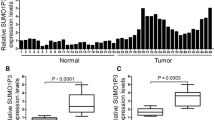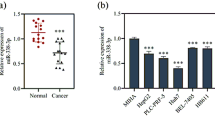Summary
Survivin, a newly identified member of IAP family, is a powerful apoptosis-inhibiting factor. It is expressed in embryonic tissues as well as in the majority of human cancers, but not in most normal adult tissues. The cancer-specific expression of survivin makes it a potential target for cancer treatment. A survivin-specific small inhibitory RNA (siRNA) was introduced into hepatocellular carcinoma cells to investigate its effect on cancer cell apoptosis, growth and sensitivity to chemotherapeutic drugs. It was found that expressions of survivin protein and proliferation index (PI) in siRNA groups were significantly decreased, the apoptosis index (AI) of siRNA groups was significantly higher than those of others groups, and the growth inhibition rate (GIR) of chemotherapeutic drugs in siRNA groups were significantly higher than those of other groups. Our study suggests that the expression of survivin may be significantly decreased in hepG2 cell after siRNA transfection. siRNA targeting survivin could induce cell apoptosis, inhibit cell proliferation and sensitize hepatocarcinoma cells to chemotherapy. Our findings provide preliminary evidence for the therapeutic use of survivin-targeted RNA interference for human tumors that express high levels of this molecule.
Similar content being viewed by others
References
Johnson M E, Howerth E W. Survivin: A Bifunctional Inhibitor of Apoptosis Protein. Vet Pathol, 2004,41:599–607
Reed J C, Wilson D B. Cancer immunotherapy targeting survivin. Clin Cancer Res, 2003,9:6310–6315
Sledz C A, Williams B R. RNA interference in biology and disease. Blood, 2005,106(3):787–794
Grunweller A, Hartmann R K. RNA interference as a gene-specific approach for molecular medicine. Curr Med Chem, 2005,12(26):3143–3161
Uprichard S L. The therapeutic potential of RNA interference. FEBS Lett, 2005, 579(26):5996–6007
Wang Y, Wang J L. The expression and implication of survivin in primary cancer. Chin Diget J (Chinese), 2002,22(8):463–469
Chen J G, Song X M. Estimation and analysis of the development of liver cander in China. Tumor Chin (Chinese), 2005,14(1):28–31
Li F. Role of survivin and its splice variants in tumori-genesis. Br J Cancer, 2005, 31;92(2):212–216
Zaffaroni N, Pennati M, Daidone M G. Survivin as a target for new anticancer interventions. J Cell Mol Med, 2005, 9(2):360–372
Grossman D, Kim P J, Blanc-Brude O P et al. Transgenic expression of survivin in keratinocytes counteracts UVB-induced apoptosis and cooperates with loss of P53. J Clin Invest, 2001,108:991–999
Shankar S L, Mani S, Oguin KN et al. Survivin inhibition induces human neural tumor cell death through cas-pase-independent and dependent pathways. J Neurochem, 2001,79:426–436
Wheatley S P, McNeish I A. Survivin: a protein with dual roles in mitosis and apoptosis. Int Rev Cytol, 2005, 247:35–88
Schimmer A D. Inhibitor of apoptosis proteins: translating basic knowledge into clinical practice. Cancer Res, 2004, 15; 64(20):7183–7190
Zangemeister-Wittke U, Simon H U. An IAP in action: the multiple roles of survivin in differentiation, immunity and malignancy. Cell Cycle, 2004,3(9):1121–1123
Author information
Authors and Affiliations
Additional information
WU Liang, male, born in 1971, Attending Physician
This project was supported by a grant from the National Natural Sciences Foundation of China (No. 30471533).
Rights and permissions
About this article
Cite this article
Wu, L., Wang, Y. & Tian, D. Knockdown of survivin expression by siRNA induces apoptosis of hepatocellular carcinoma cells. J. Huazhong Univ. Sc. Technol. 27, 403–406 (2007). https://doi.org/10.1007/s11596-007-0413-6
Received:
Issue Date:
DOI: https://doi.org/10.1007/s11596-007-0413-6




